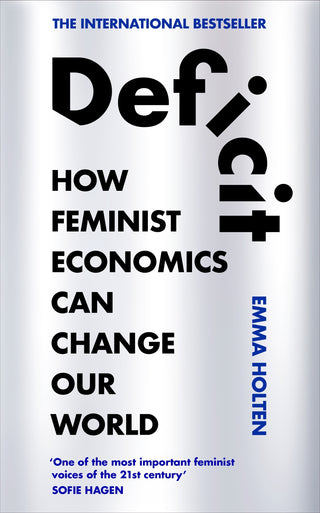Deficit: How Feminist Economics Can Change Our World
- Unit price
- / per
-
Author:Emma Holten
-
ISBN:9780753561478
-
Publication Date:March 2025
-
Edition:1
-
Pages:288
-
Binding:Paperback
-
Publisher:Random House
-
Country of Publication:United Kingdom


A Back Order button means that we don’t have the book in stock at our store. It may already be on order – or we can order it for you from a publisher or distributor at no additional cost.
As we source items from around the globe, a back-order can take anywhere from 5 days to several weeks to arrive, depending on the title.
To check how long this might take, you’re welcome to contact us and we can provide an ETA or any other information you need. We recommend checking the timeframe before committing to an online order.
Deficit: How Feminist Economics Can Change Our World
- Unit price
- / per
-
Author:Emma Holten
-
ISBN:9780753561478
-
Publication Date:March 2025
-
Edition:1
-
Pages:288
-
Binding:Paperback
-
Publisher:Random House
-
Country of Publication:United Kingdom
Description
Invisible Women meets Doughnut Economics- An international bestseller from an exciting new voice in the feminist space.
In 2020, Emma Holten read an article stating that women were a net 'deficit' to society. Women apparently took more than they gave- they took more parental leave, frequently worked part-time, and typically worked lower paying jobs in the public sector. They also 'drained' the public purse by doing expensive things like give birth. Denmark would be richer if women's lives looked more men's, the experts concluded. It's a similar story across the globe.
How did we get here? How are the contributions of half the population seen as a loss? In Deficit, Emma Holten traces how economic thinkers - from the Enlightenment onwards - created a value framework that left out 'women's work' and acts of care. She reveals how the economic models that drive political decisions today are just as flawed. They shape our world with rhetoric that sounds objective but is really based on centuries of oversight and omission, with terrible consequences for us all.
If we cannot properly value the things that matter, how can we build a better future?
Adding product to your cart
You may also like
A Back Order button means that we don’t have the book in stock at our store. It may already be on order – or we can order it for you from a publisher or distributor at no additional cost.
As we source items from around the globe, a back-order can take anywhere from 5 days to several weeks to arrive, depending on the title.
To check how long this might take, you’re welcome to contact us and we can provide an ETA or any other information you need. We recommend checking the timeframe before committing to an online order.
You may also like
You may also like
-
Invisible Women meets Doughnut Economics- An international bestseller from an exciting new voice in the feminist space.
In 2020, Emma Holten read an article stating that women were a net 'deficit' to society. Women apparently took more than they gave- they took more parental leave, frequently worked part-time, and typically worked lower paying jobs in the public sector. They also 'drained' the public purse by doing expensive things like give birth. Denmark would be richer if women's lives looked more men's, the experts concluded. It's a similar story across the globe.
How did we get here? How are the contributions of half the population seen as a loss? In Deficit, Emma Holten traces how economic thinkers - from the Enlightenment onwards - created a value framework that left out 'women's work' and acts of care. She reveals how the economic models that drive political decisions today are just as flawed. They shape our world with rhetoric that sounds objective but is really based on centuries of oversight and omission, with terrible consequences for us all.
If we cannot properly value the things that matter, how can we build a better future?
-
-
Author: Emma HoltenISBN: 9780753561478Publication Date: March 2025Edition: 1Pages: 288Binding: PaperbackPublisher: Random HouseCountry of Publication: United Kingdom
Invisible Women meets Doughnut Economics- An international bestseller from an exciting new voice in the feminist space.
In 2020, Emma Holten read an article stating that women were a net 'deficit' to society. Women apparently took more than they gave- they took more parental leave, frequently worked part-time, and typically worked lower paying jobs in the public sector. They also 'drained' the public purse by doing expensive things like give birth. Denmark would be richer if women's lives looked more men's, the experts concluded. It's a similar story across the globe.
How did we get here? How are the contributions of half the population seen as a loss? In Deficit, Emma Holten traces how economic thinkers - from the Enlightenment onwards - created a value framework that left out 'women's work' and acts of care. She reveals how the economic models that drive political decisions today are just as flawed. They shape our world with rhetoric that sounds objective but is really based on centuries of oversight and omission, with terrible consequences for us all.
If we cannot properly value the things that matter, how can we build a better future?
-
Author: Emma HoltenISBN: 9780753561478Publication Date: March 2025Edition: 1Pages: 288Binding: PaperbackPublisher: Random HouseCountry of Publication: United Kingdom
-



